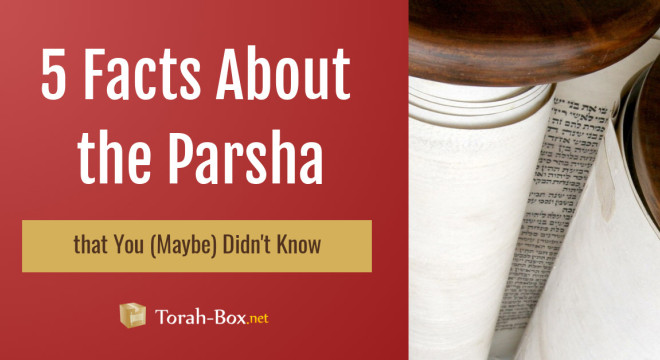
Kedoshim
5 Facts About the Parsha Kedoshim That (Maybe) You Didn't Know
Discover and learn every week, "5 Facts" written on the weekly Parsha that you can share at your Shabbos table.
19:3
אִ֣ישׁ אִמּ֤וֹ וְאָבִיו֙ תִּירָ֔אוּ וְאֶת־שַׁבְּתֹתַ֖י תִּשְׁמֹ֑רוּ אֲנִ֖י ה אֱ-לֹהֵיכֶֽם׃
You shall each revere his mother and his father, and keep My sabbaths: I the LORD am your God.
What do we learn from the juxtaposition of these 2 seemingly unrelated laws?
- From the juxtaposition of these 2 commandments, the Sages learn that while one must honor one’s parents, it can’t be at the expense of transgressing any Torah commandment.
- From the juxtaposition of the mitzvah of respecting one’s parents and keeping the Shabbat, the sages learn that one who respects his parents will have Divine assistance to ensure that he does not accidentally violate Shabbat...
19:4
אַל־תִּפְנוּ֙ אֶל־הָ֣אֱלִילִ֔ים וֵֽאלֹהֵי֙ מַסֵּכָ֔ה לֹ֥א תַעֲשׂ֖וּ לָכֶ֑ם אֲנִ֖י ה אֱ-לֹהֵיכֶֽם׃
Do not turn to idols or make molten gods for yourselves: I the LORD am your God.
What are the 10 different idols mentioned in the Torah?
- There are 10 different idols mentioned in the Torah: Ellilim, Pesel, Masechah, Matzevah, Atzavim, Terafim, Gilulim, Shikutzim, Chamanim, Asherim.
19:18
לֹֽא־תִקֹּ֤ם וְלֹֽא־תִטֹּר֙ אֶת־בְּנֵ֣י עַמֶּ֔ךָ וְאָֽהַבְתָּ֥ לְרֵעֲךָ֖ כָּמ֑וֹךָ אֲנִ֖י ה׃
You shall not take vengeance or bear a grudge against your countrymen. Love your fellow as yourself: I am the LORD.
What laws applicable to one sentenced to death are learned from this verse?
- From here the Talmud learns that an execution must be carried out immediately after sentencing, so as not to cause unnecessary anguish to the convict.
- As well, from here the Talmud learns, that the court must select the most compassionate form of death possible for a convict. So too, it must be given in a way that is not embarrassing. It is generally assumed that the most compassionate form of death is decapitation.
19:19
אֶֽת־חֻקֹּתַי֮ תִּשְׁמֹרוּ֒ בְּהֶמְתְּךָ֙ לֹא־תַרְבִּ֣יעַ כִּלְאַ֔יִם שָׂדְךָ֖ לֹא־תִזְרַ֣ע כִּלְאָ֑יִם וּבֶ֤גֶד כִּלְאַ֙יִם֙ שַֽׁעַטְנֵ֔ז לֹ֥א יַעֲלֶ֖ה עָלֶֽיךָ׃ (פ)
You shall observe My laws. You shall not let your cattle mate with a different kind; you shall not sow your field with two kinds of seed; you shall not put on cloth from a mixture of two kinds of material.
What is the source for the prohibition of Sha’atnez and who’s exempt?
- The original source for the prohibition against wearing a garment made of both wool and linen is the story of Cain and Abel. Cain offered God an offering of flax (linen) and Abel offered God a sheep (wool). Since these two species led to the first crime (murder!) in history, God decreed that they should never mix upon our bodies.
- Although a garment of wool and linen, known as kilayim, is normally forbidden to be worn, it may be used to clothe the dead. This is because the dead are not obligated to observe mitzvot.
20:6
וְהַנֶּ֗פֶשׁ אֲשֶׁ֨ר תִּפְנֶ֤ה אֶל־הָֽאֹבֹת֙ וְאֶל־הַיִּדְּעֹנִ֔ים לִזְנ֖וֹת אַחֲרֵיהֶ֑ם וְנָתַתִּ֤י אֶת־פָּנַי֙ בַּנֶּ֣פֶשׁ הַהִ֔וא וְהִכְרַתִּ֥י אֹת֖וֹ מִקֶּ֥רֶב עַמּֽוֹ׃
And if any person turns to ghosts and familiar spirits and goes astray after them, I will set My face against that person and cut him off from among his people.
What is the difference between a Necromancer and the Sorcerer?
- A Meonen or Mekashef/ necromancer is someone who communicates with the dead and makes the dead person’s voice heard from between his joints or from his armpits. A Yideoni/sorcerer is one who places a bone of an animal, known as a Yadua, in his mouth, and the bone speaks on its own.
- The Sages taught, that a “necromancer” includes both one who raises the dead with his Zekhur and one who inquires about the future from a skull/Begulgolet. The difference between these two types of necromancers is that one who raises the dead with his Zekhur causes them to rise in an upside-down manner. So too, this form of sorcery does not work on Shabbos. By contrast, one who predicts the future from a skull can raise the dead in a normal manner. This form of sorcery works on Shabbath.
Torah-Box.net Account
To access the entire Torah-Box.net website, sign up for free in less than a minute.
Weekly Parsha
 Candle Lighting - New York
Candle Lighting - New York
Friday March 6th, 2026 at 17:34 *Shabbat ends at 18:35 *
change my location
* Times given as an indication, check the times of your community











